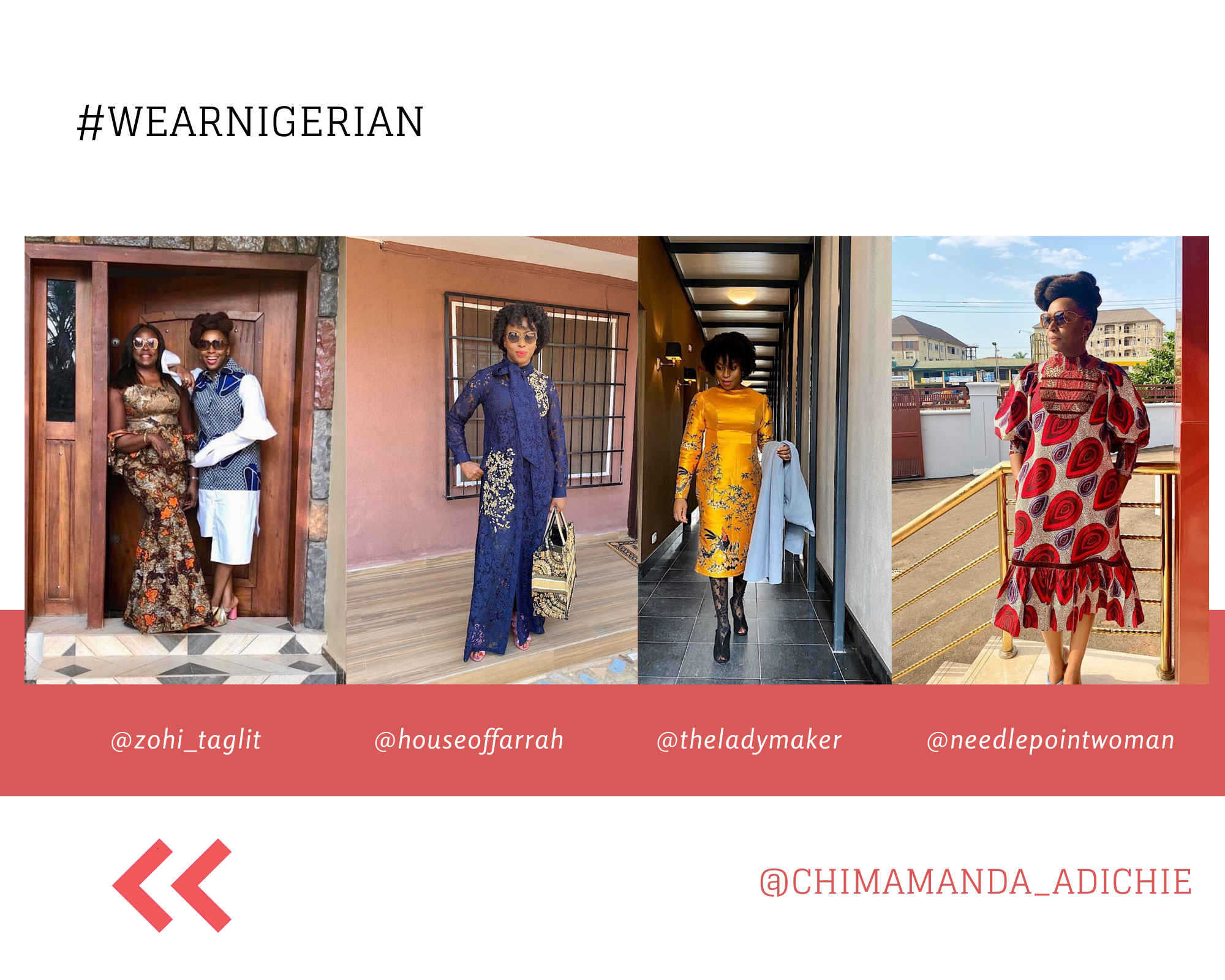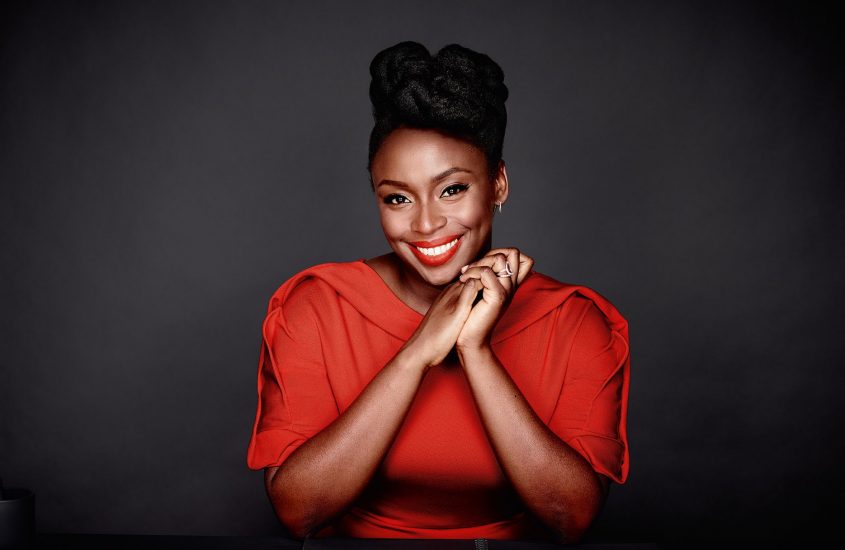She is a celebrated Nigerian writer, a thriving voice in the fight against gender discrimination and, to break more stereotypes assigned to feminists, she is beautiful and was included by Vanity Fair magazine in the 2016 list of best-dressed women in the world.
And what is so strange about talking of beauty, fashion and feminism?
In an interview to The New York Times, when she signed a make-up range of a famous cosmetics brand – No 7, from Boots group – Chimamanda explains that concepts related to the feminine universe, such as beauty and fashion, are not taken seriously due to a culture that diminishes women.
“I think it’s part of a larger picture of a world that simply doesn’t give women the same status that it gives men. There are many examples, and some have more serious consequences. All over the world, there is violence against women, and many cultures have ways of justifying it or minimizing it. But I think you can actually draw a line from that to other feminine pursuits that culture diminishes.”
Chimamanda Adichie para New York times
Not being taken seriously means being associated to something less important, futile and, in many times, reinforcing a stereotype that physical beauty is less important than women’s intellectual capacity or worse still, that these two things are incompatible.
Watch the video of Boost No7 campaign
But this fashion icon, who defends that the concept of beauty must be broadened, is also a feminist woman and understands that women must be free to express their individuality, in the way they dress, behave, speak and think.
“The problem with gender is that it prescribes how we should be rather than recognizing how we are. Imagine how much happier we would be, how much freer to be our true individual selves, if we didn’t have the weight of gender expectations.”
Chimamanda adichie – WE SHOULD ALL BE FEMINISTS
FEMINIST AND FEMININE
Currently still, a strong counterpoint presented by women who don’t identify as feminists is to state “I am not feminist, I am feminine”.
I believe this perception is mistaken, that these two aspects not being able to co-exist goes back to the origins of the feminist movement. I convinced myself of this when I heard the podcast Maria Vai com as Outras[D1] , with Rosiska Darcy de Oliveira.
[D1]Original Title in Portuguese
Maria Vai Com as Outras – #10 – Sexual Division at Work.
Rosiska was one of the founders of feminism in Brazil and in Switzerland. In this interview, she tells about the difficulties faced to consolidate the movement around here. Many of these hurdles are common among resistance movements and those questioning the status quo, persecution, violence, boycott, but she talked about a peculiarity, that was perhaps only faced by the feminist movement, which was ridicule.
In the attempt to vilify and empty the movement, feminist women were labelled “horrendous, unloved, hysterical, ugly, dreadful, with no sense of humor, perverts”, according to Rosiska.
“We faced what is the most difficult to face, which is ridicule: “You are ridiculous, obfuscated women, women who didn’t succeed.” It was a very humiliating treatment, against women who are nothing as such. We were very successful women.”
Rosiska Darcy de oliviera – “maria vai com as outras
Fortunately, these pioneers were brave, they could consolidate the cause and achieve many rights that currently we, women, can benefit from.
If you do understand portuguese and want to hear the complete podcast, I utterly recommend it.
The content is below, remembering it is in portuguese
BREAKING STEREOTYPES
In a recent video to Marie Claire magazine, Chimamanda also helps in breaking other stereotypes about feminist women. She comments on other phrases by women who call themselves anti-feminists:
I am not feminist, I am feminine
I don’t need feminism because I want to get married and have children
Why don’t they prevent abortion instead of killing babies?
It is ridiculous and disgusting not to shave. This is not empowerment
She
IN THE FASHION WORLD
And if we agree that being feminine, enjoying fashion and beauty don’t diminish women at all, let’s talk about fashion.
I follow Chimamanda on Instagram @chimamanda_adichie and love the way she dresses. There are countless fashion influencers on the network and, though she doesn’t position herself as such, I understand she makes a difference by also helping to break paradigms in this fashion universe for the authenticity of her clothes.
She is an African, black woman and dresses many brands that are also African, with a strong influence from local culture. In a globalized world in which the big names who dictate the trends in the fashion industry are, mostly, European or American, Chimamanda also occupies this space by giving visibility to a lesser known and publicized fashion.
Recently, she launched the #wearnigerian movement to encourage local producers. On Facebook, that’s how she introduced the movement:
My Project ‘Wear Nigerian’ on Instagram
The Nigerian government’s disastrous economic policies have led to a reduction in the value of the naira and therefore in disposable income, a change in values, a disorientation of the middle class, and most of all, to a debilitating sense of uncertainty.
If we are to grasp for a silver lining, then the ‘Buy Nigerian to Grow The Naira’ rhetoric is one.
In that spirit, I recently decided to wear mostly Nigerian brands for my public appearances. (Before, by the way, President Buhari declared ‘Made in Nigeria dress’ days.)
In the past few weeks, I’ve bought more Nigerian brands than I ever have in the past. I’ve discovered new names. I’ve been filled with admiration for the women and men running their businesses despite the many challenges they face. I’m particularly interested in ‘inward-looking’ brands, those for whom dressing Nigerian women is as important as other goals.
I’ve changed quite a few dodgy zippers, been disappointed by some poor quality fabrics, and been impressed by some detail-oriented finishing. Overall, I love the clothes, their cut, their whimsy, their color, their flair, their ability to make me feel like myself. Their makers, from designer to tailor to button-fixer to okada-delivery-person, deserve to be supported.
At the suggestion of my very au fait nieces Chisom and Amaka – who think Aunty is a hilarious luddite dinosaur (and they have a point, sadly) – I am now on Instagram at chimamanda_adichie documenting my ‘Wear Nigerian’ project.
Chimamanda no Facebook
#WEARNIGERIAN
I’ve researched some of the brands she recently published in her profile and I leave the links here
THE LADY MAKER @the_ladymaker https://the-ladymaker.myshopify.com
NEEDLE POINT WOMAN @needlepointwoman
ZOHI TAGLIT @zohi_taglit
HOUSE OF FARRAH @houseoffarrah
THE FIA FACTORY @thefiafactory www.fiafactory.com
NKWO DESIGN @nkwo_official www.nkwo.design/
THE MUSE FACTORY 5 @themusefactory_ https://themusefactory5.wixsite.com/themusefactory
MEENA @meenaofficial www.meenanigeria.com/

The fashion industry still faces challenges related to aspects of sustainability, responsible production and consumption, but the promotion of local products is a way of minimizing impacts in this value chain.
LET’S ALL BE THE WAY WE WANT
Feminism is related to the defense of rights and to the understanding that women can express themselves, including with attributes linked to the feminine highlighting their beauty, self-esteem and intelligence.
“I decided to stop apologizing for being feminine. And I want to be respected for my femininity.”
CHIMAMANDA ADICHIE – WE SHOULD ALL BE FEMINISTS
So, let’s all be the way we want, let’s all be feminists!

* English is not my native language. If you find any opportunity of improvement, let me know. I’ll love to learn from experts!
Photo credit: No7- Booster Campain
